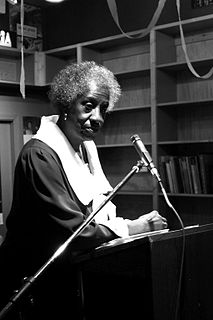A Quote by Brene Brown
Courage is like—it’s a habitus, a habit, a virtue: You get it by courageous acts. It’s like you learn to swim by swimming. You learn courage by couraging.
Related Quotes
this is what I know about courage: You don't have to think about courage to have it. You don't have to feel courageous to be courageous. You don't sit down and say you're going to be courageous. At the moment of action, you don't see it as a courageous act. Courage is the most hidden thing from your eye or mind until after it's done. There's some inner something that tells you what's right. You know you have to do it to survive as a human being. You have no choice.
Solving problems is a practical skill like, let us say, swimming. We acquire any practical skill by imitation and practice. Trying to swim, you imitate what other people do with their hands and feet to keep their heads above water, and, finally, you learn to swim by practicing swimming. Trying to solve problems, you have to observe and to imitate what other people do when solving problems, and, finally, you learn to do problems by doing them.
I often feel like saying, when I hear the question 'People aren't ready,' that it's like telling a person who is trying to swim, 'Don't jump in that water until you learn how to swim.' When actually you will never learn how to swim until you get in the water. And I think people have to have an opportunity to develop themselves and govern themselves.
Countrymen, the task ahead is great indeed, and heavy is the responsibility; and yet it is a noble and glorious challenge - a challenge which calls for the courage to dream, the courage to believe, the courage to dare, the courage to do, the courage to envision, the courage to fight, the courage to work, the courage to achieve - to achieve the highest excellencies and the fullest greatness of man. Dare we ask for more in life?
Let us have the courage to defy the consensus, the courage to stand for principle. Courage, not compromise, brings the smile of God’s approval. Courage becomes a living and an attractive virtue when it is regarded not only as a willingness to die manfully, but also as a determination to live decently. A moral coward is one who is afraid to do what he thinks is right because others will disapprove or laugh. Remember that all men have their fears, but those who face their fears with dignity have courage as well.
Without courage, you cannot practice any other virtue. You have to have courage - courage of different kinds: first, intellectual courage, to sort out different values and make up your mind about which is the one which is right for you to follow. You have to have moral courage to stick up to that - no matter what comes in your way, no matter what the obstacle and the opposition is.

































